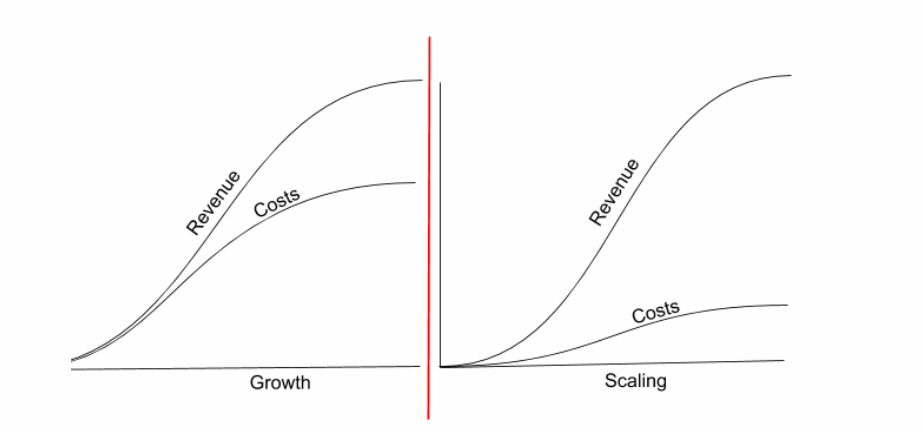Explora los resultados de búsqueda web relacionados con este dominio.
Many start-ups experience enormous popularity and runaway growth, but only a few go on to become stable giants. What separates them from the pack? They all go through a developmental stage called extrapolation, say three business school professors. This stage isn’t part of traditional ...
Many start-ups experience enormous popularity and runaway growth, but only a few go on to become stable giants. What separates them from the pack? They all go through a developmental stage called extrapolation, say three business school professors. This stage isn’t part of traditional organizational theory, which holds that businesses begin in exploration mode (testing out hypotheses about how they’ll solve problems and learning whether people will pay for their solutions) and then move into exploitation mode (as growth slows and they fine-tune their business models to sharpen their advantage).A new enterprise needs multiple strengths to navigate this phase—such as a proven monetization approach, a strong go-to-market strategy, network and density effects, and capital. It also must systematically identify and remove internal business-model constraints on growth that could prevent it from achieving scale.Read more on Entrepreneurship or related topics Scaling entrepreneurial ventures, Start-ups, Growth strategy, Competitive strategy and Entrepreneurial business strategy · A version of this article appeared in the January–February 2023 issue of Harvard Business Review. ... Jeffrey F. Rayport is a senior lecturer in the Entrepreneurial Management Unit at Harvard Business School.Martin Kupp is an associate professor of entrepreneurship and strategy at ESCP Business School. ... Read more on Entrepreneurship or related topics Scaling entrepreneurial ventures, Start-ups, Growth strategy, Competitive strategy and Entrepreneurial business strategy


Many entrepreneurs don't recognize the difference between growth and scaling in business terms, but there’s a crucial distinction between the two.
Many people use the words growth and scaling in business interchangeably, but there's a crucial difference. We explain.Because SaaS businesses often sell highly-technical products to · niche audiences who may be difficult to reach, they may have to spend substantially more money to reach potential buyers and close new accounts. ... lifetime value (LTV), which makes a relatively high CAC sustainable over time — with enough cash flow and runway, the company to keep scaling up and up. It's our most popular founder resource! Grab your copy of SaaS Startup Growth Metrics:The company’s gains outpaced its losses, meaning it didn't just grow — it grew at scale. As you launch a new business, you should already be thinking about scaling. If you simply continue trying to increase your revenue by adding more resources with a corresponding increase in costs, your growth is likely to stagnate.But there’s a crucial difference between growing and scaling in business terms, and it’s important to speak precisely about kind of growth you have in mind and to convey what's really happening with the business.
Brands in this industry must keep up, and scaling efficiently will set you apart and guarantee continued growth and market leadership.
Brands in this industry must keep up, and scaling efficiently will set you apart and guarantee continued growth and market leadership. Scaling a SaaS business involves accommodating growing customer demands while still seamlessly delivering services. Major challenges include: • Infrastructure development: While your customer base grows, so must your technical foundation to efficiently handle increased data and user numbers.Many of our SaaS clients were able to establish very successful companies that have been around for decades, only to find themselves struggling to hit revenue growth quotas. I’ve been helping SaaS companies hit unicorn status for over 15 years, so I have tremendous empathy for the internal changes and chaos that inevitably happen along the way. Regardless of whether it's a startup or a company that's been around for 25 years or more, I’ve encountered the same situations over and over again.• Team growth: Transitioning from a close-knit group to a larger, more specialized team can lead to growing pains, but it also opens doors for significant leadership and organizational growth opportunities. • Innovative evolution: Your commitment to continuous innovation and development must revolve around ensuring that you meet your customers' evolving needs to keep products, services and the brand itself competitive and relevant.• Effective project management: Scaling means making every second count, and adopting agile project management methodologies can enhance team performance and accelerate product development. ... • Market expansion: Exploring new markets or verticals is a strategic approach to driving growth.
Lately, I have been thinking about how to help input more velocity in startups, and help them scale. I started reflecting on the best ways to achieve that, and ended up building an inventory of…
Lately, I have been thinking about how to help input more velocity in startups, and help them scale. I started reflecting on the best ways…Plus, it’s awfully hard to predict who needs what information in a high-growth startup. So leaving these meetings open to anyone could help people get the information they need. If you send weekly status report emails too, are these two redundant? Friday Wins are about involving the whole team by showing what they built. It is about invigorating the team. It’s a fun and friendly event. It also enables the team to develop soft skills such as public speaking and demoing.Most — ideally all — people join high-growth startups because they’re ambitious in some way. High growth implies a lot of opportunity to grow. My inspiration is Radical Candor by Kim Scott. There are three steps in career development discussions that I like to see:But what matters to the business usually only represents a portion of all the work to be done. There are indeed other ways to scale your resources, such as using contractors or SaaS tools, for what is not core to your business. Instead of thinking about scaling teams by default and comparing your employee growth with other businesses, stay more nimble.

Here are seven strategic ways small businesses can utilize AI to fuel growth and efficiency.
Business Development Manager at FANSEE TV. ... While AI might sound like a high-tech luxury only accessible to big corporations, it’s increasingly becoming a game-changer for small businesses willing to embrace its potential. Here are seven strategic ways small businesses can utilize AI to fuel growth and efficiency.Adopting AI might seem daunting, but the benefits it brings to operational efficiency, customer engagement and strategic planning are invaluable for small businesses aiming to scale. The key is to start small—identify one or two areas where AI can have the most immediate impact and gradually integrate more AI tools as the business grows. By leveraging the power of artificial intelligence, small businesses can not only survive but thrive in the competitive modern marketplace. Embracing AI is not just about keeping up with technology; it's about setting the stage for sustainable growth and success.AI-driven process automation can streamline a range of administrative and operational tasks, from payroll processing to regulatory compliance. This automation reduces the risk of human error and frees up human resources for higher-value activities, thus allowing the business to scale operations without proportionately increasing its workforce.The future is often unpredictable, but AI can provide a glimpse into what lies ahead. Predictive analytics can help small businesses anticipate market trends, understand customer needs and assess the viability of entering new markets or developing new products.
If you’re serious about moving ... in the startup phase: The first key is the desire to really make a dent in your industry or even the entire society. As founder or CEO, you need to truly want your business to scale. Ambitious entrepreneurs need to create realistic growth targets and develop plans and ...
If you’re serious about moving your business to the next level, there are 7 fundamentals you need to take care of in the startup phase: The first key is the desire to really make a dent in your industry or even the entire society. As founder or CEO, you need to truly want your business to scale. Ambitious entrepreneurs need to create realistic growth targets and develop plans and concrete actions of how growth will be achieved.After focusing mainly on the area of product development, organic growth, and perhaps marketing and sales in your startup phase, you’ll now also need talents in HR, administration, payroll, and support. Like Jim Collins’ best-seller “Good to Great” read: you have to have the right people in the right seats on the bus.But don’t worry; they’re not stipulated in this article to make you lose your excitement or belief in your business model. Instead, they are meant to inspire you to take some rigorous and focused action if you are serious about skyrocketing your company’s growth. Although often used to define a type of organization, the terms “startup” and “scaleup” actually refer to company phases or growth stages.It’s on a mission to find its repeatable scalable business model. They are still experimenting with things like segmentation, customer acquisition costs, and product features. When people join your team at this phase, they decide to forgo stability for the promise of major growth and the excitement of making an immediate impact. Where a startup is still in the early stages of getting their product in the right hands, securing funding, and getting their ducks in a row, a scale-up has already established their product in the market and is well on their way to accelerate their growth.

Most of the standard techniques ... into a business apply to tech startups, too, such as investing in R&D, consistently monitoring the competition and assessing industry trends, diversifying revenue streams and fostering a culture of innovation and talent development. It’s also important that the management team of your startup effectively models the values you want the startup to embody. I recommend putting a strong focus on striving for personal and professional growth, viewing failure ...
Most of the standard techniques for building resiliency and adaptability into a business apply to tech startups, too, such as investing in R&D, consistently monitoring the competition and assessing industry trends, diversifying revenue streams and fostering a culture of innovation and talent development. It’s also important that the management team of your startup effectively models the values you want the startup to embody. I recommend putting a strong focus on striving for personal and professional growth, viewing failure as a learning opportunity, valuing and responding to continuous feedback, and constantly staying customer-focused.What strategies can founders implement to help ensure their tech startup survives and thrives?You can often enhance your glocalization efforts by forming market-based strategic partnerships, hiring area talent and granting some operating autonomy to your regional business units. Obviously, scalable growth also requires consistent quality management across markets. Fortunately, many familiar quality management techniques—standardizing processes, building robust communication channels, applying stringent performance management—tend to remain relevant and helpful as your startup grows.By fostering a culture of innovation, adaptability and collaboration, startups can position themselves for sustainable growth and success and help avoid the 90% percent failure rate that dooms so many. Forbes Business Council is the foremost growth and networking organization for business owners and leaders.
You’ve probably been there studying ... startup development. Go back now to check how the most successful of them interact with their customers. Such research will help to recognize some details that will help to scale your business by attracting new customers. Though marketing is the core struggle of young startup companies, it is the only way to represent your product and reach out to your target audience, which is crucial for business growth...
You’ve probably been there studying your competitors at the very beginning of your startup development. Go back now to check how the most successful of them interact with their customers. Such research will help to recognize some details that will help to scale your business by attracting new customers. Though marketing is the core struggle of young startup companies, it is the only way to represent your product and reach out to your target audience, which is crucial for business growth.But as your project grows and scales, the pool of tasks and responsibilities grows significantly. You might still want to take control of everything, but it becomes physically impossible. Scaling up business tips to make your startup independent from you: ... Let some failures happen. It’s the part of the growth. Following those rules, you can shift some responsibility and find some time for developing new ideas.If you aren’t ready, 1000 customers will probably overload your business – you need to work on the growth of such a shop first. CityFALCON is a modern financial news aggregator. It rates financial news and authors according to the clients’ preferences using Natural Language Processing. The Client met Sloboda Studio at the very early stages of the project. Back then, CityFALCON was just an MVP that needed to be developed, upgraded, and scaled.As a well-known banker Mark Hoppe said, “Scaling up is important for businesses, but it does come with serious risks, so it’s essential to plan for these.” ... Thanks for your interest! The outstaff vs in-house dev cost calculator is on the way to your email inbox. Premature scaling happens when the startup is expanded too early or too fast that the product is not able to handle the growth.

From my personal experience as a young CEO, I discovered that too many businesses think more sales means it’s time to scale. However, that’s not the whole picture.
For instance, by leveraging new digital channels, you can market to new prospects—and win their business. Your team players are the engine that powers your company. I’ve found that motivated team members with growth mindsets can propel a company to new heights.You should also prioritize their growth and happiness and not overburden them with extra-long work hours. Furthermore, as you invest in finding the right talent for your business, you should consider outsourcing some of your tasks when possible, as that can free you up to focus more on the strategic aspect of scaling your company.Although embracing change and being willing to adjust to new business realities is a hallmark of adaptability and resilience, consistency is key to achieving results. Therefore, while you might change aspects of your business, such as fine-tuning your unique value proposition, you should not lose track of your strategy and roadmap for scalability and growth.Forbes Business Council is the foremost growth and networking organization for business owners and leaders.
Strategizing effectively for scaling involves two things: enhancing your business model and developing your business strategy accordingly. Break down your business model into components and see how each element contributes to your startup’s growth. From our experience helping businesses scale ...
Strategizing effectively for scaling involves two things: enhancing your business model and developing your business strategy accordingly. Break down your business model into components and see how each element contributes to your startup’s growth. From our experience helping businesses scale through successful apps, we recommend improving the following aspects of your startup operations:The figure below shows how scaling and growth differ in terms of the gap between revenue and expenses. ... Examples of scaling solutions include better operational techniques and high-tech equipment. I will explain all these in the following sections. Now that you know what startup scaling is and why it’s a good way forward, it’s time to learn when to scale your business.Aside from financing, networking with strategic partners helps in scaling. Some examples of strategic partners include suppliers and mentors. These entities both provide good business and valuable advice on effective startup development through scaling. ... Are the conditions right for your startup to scale?Is it the time to consider startup scaling? Here are 3 indicators your business is due for plus some tips on how to draw and execute a smart scaling strategy.

Because of the costs associated with development, entrepreneurs navigating the early years of startups have become obsessed with the concept of scaling. The critical difference from growth is that scale is achieved by increasing revenue without incurring significant costs.
One common thread between all types of startups is navigating the pathways between growth and scaling. This rings true whether you're a business with dozens of employees or a duo working out of a studio apartment. While some startups are easier to scale than others, all companies must grow. All businesses are created, born of passion and promise, aiming to develop into valuable entities able to scale successfully; they bring an exceptional return on investment for all parties involved.Related: Use This Simple Military Strategy to Boost Your Business · Before diving into four key tactics that founders should implement, clarifying growth versus scaling would be a solid foundation. Because of the costs associated with development, entrepreneurs navigating the early years of startups have become obsessed with the concept of scaling. The critical difference from growth is that scale is achieved by increasing revenue without incurring significant costs.Also supported by the SBA are Small Business Development Centers, known as SBDCs; these Small Business Development Centers are located around the country to help start and develop small businesses with no-cost consulting and low-cost training. Find the mentors you need and the startup programs willing and able to support your business; lean on these individuals who are eager to help and guide your business from growth to scaling up.Take, for example, Google, a spectacular example of founders defining growth vs. scale for their company and sustaining it. Alphabet's crown jewel has solidified an operating philosophy that has allowed it to continually add customers (either paying business clients or ad-supported free users) while keeping costs at a minimum. Startup failure is widespread, with 90% of startups failing within five years.


Silicon Valley often touts rapid scaling as the best strategy for achieving startup success. However, new research reveals that scaling early, particularly within the first 12 months, significantly raises the risk of startup failure, especially for two-sided platforms.
The question is: Does the “fast and furious” or “slow and steady” approach to scaling reign supreme in the race to startup success? Read more on Entrepreneurship or related topics Entrepreneurial business strategy, Scaling entrepreneurial ventures, Start-ups and Growth strategy

The “mighty-middle” segment of startups falls between venture-scale unicorns and small businesses. These startups aim for valuations in the high single-digit to high tens of millions within 5-10 years, targeting midsize niches with significant growth potential.
The popular conception of entrepreneurship is that it comes in two sizes. Venture-scale startups aim for billion-dollar valuations within a decade by targeting large markets disruptively through innovative technologies or business models. Such aspiring “unicorns” capture the attention of many venture capitalists and angels and include success stories such as Google, Meta, and Airbnb.Benjamin Hallen is the Dempsey Endowed Professor in Strategy and Entrepreneurship at the Foster School of Business, University of Washington and an associate editor at the Strategic Management Journal.Read more on Entrepreneurship or related topic Entrepreneurial business strategy
To untangle this web, we give more ... over time achieved by extensive development. In contrast, scaling implies exponential business development, achieved by making changes to its existing structure and operations....
The latter reflects stages of startup development — from the idea behind your business, to seed stage and even selling the startup. · Choosing the most suitable business model that will allow you to win over new markets, increase the number of returning customers and streamline the processes along the way, think not only about your strengths, but also about expertise you may lack to achieve this goal. Outsourcing development that allows you to build scalable solutions or launch MVP to assess both scale and growth capacity of the startup.To untangle this web, we give more examples, not all related to software development – such simplification helps to explain scale vs growth issue better. ... Growth can be defined as an increase in sales or revenue over time achieved by extensive development. In contrast, scaling implies exponential business development, achieved by making changes to its existing structure and operations.It is growth, because you are not changing anything about how your business operates except adding new staff members (i.e., maintaining the status quo). · If you take one person out of each department and create a separate development group, hire an outside consultant to streamline processes, outsource creating a mobile version of your desktop app — you are on the scaling path. Does it imply a linear or non-linear growing process? Startup growth is a linear process, meaning that your business will grow at a steady pace for a long time before you start experiencing exponential growth.Scaling startup is non-linear, meaning it doesn’t follow any set pattern or progression — it can happen overnight or take years, depending on how much time and effort you put into it. You measure growth in a single line of development, but scaling business model implies assessment based on multiple factors and parameters.

The key difference with growth is that scale is achieved by increasing revenue without incurring significant costs. While adding customers and revenue exponentially, costs should only increase incrementally, if at all. The difference between growth and scaling becomes most clear when a company ...
The key difference with growth is that scale is achieved by increasing revenue without incurring significant costs. While adding customers and revenue exponentially, costs should only increase incrementally, if at all. The difference between growth and scaling becomes most clear when a company isn’t a startup anymore, but is not a large corporation yet, either. At this critical stage the business will have to decide between growing at a regular rate or switching over to faster company scaling.But as your business develops you must turn your attention to strategic questions and leave the day-to-day operations of your business to others." Hopefully this article has helped to demystify the nuances around growth and scaling. In truth, both are important and the difference for companies is often a matter of timing. But as we've seen, there are clear steps businesses can take to prepare themselves for the scaleup phase.Growth vs scaling might sound like the same thing, but within the context of modern business they have very different meanings — and only one of them is what you should be aiming for.Earlier funding rounds are used for MVP development and to establish market fit, and if they're able to secure further funding, it's to expand quickly. Typical scaleups have a product that scales well - it appeals to buyers far greater than the current market served. But, because they've moved quickly as a startup, a lot of internal processes aren't designed to scale.

As a startup founder, I've had ... of rapid business growth and facing the challenges it brings. Scaling a startup is high-stakes. The exhilaration of acceleration is matched by a constant need for course corrections and split-second decisions. Here are some of my insights on how you can scale your startup ...
As a startup founder, I've had the privilege of witnessing the thrill of rapid business growth and facing the challenges it brings. Scaling a startup is high-stakes. The exhilaration of acceleration is matched by a constant need for course corrections and split-second decisions. Here are some of my insights on how you can scale your startup for rapid growth while hopefully avoiding some of the worst pitfalls.If you're planning to raise additional capital, be prepared to demonstrate a clear path to profitability and a solid track record of growth. Yes, scaling a startup is complex and challenging, but it's also one of the most rewarding experiences a business leader can have. Be prepared to white-knuckle a lot of the process, but don’t be afraid to jump in. Stagnation for startups is equal to death, so I say scale fast and scale now while you can.Scaling a startup is complex and challenging, but it's also one of the most rewarding experiences a business leader can have.Of course, scaling means hiring, and talent is the lifeblood of any startup. As you scale, you'll need to attract and retain top performers who can drive your growth.
Automation: The Secret Weapon for Growth One of the smart ways to drive growth is by leveraging technology to automate key processes.
Sure, a startup might begin with a close-knit team and a simple model, but scaling it requires strategic vision, creativity and operational excellence. Whether you're leading a small business or an established company, scaling effectively is critical for long-term success. One of the smart ways to drive growth is by leveraging technology to automate key processes.Leadership growth can come from personal transformation, not just traditional business methods. At the end of the day, scaling isn’t just about getting bigger. It’s about doing it in a way that’s sustainable. Entrepreneurs need to zero in on a few critical things: streamlining processes, trusting your team, and keeping your customers front and center. Whether it’s through automation, delegation, or leadership development, scaling a business is a continuous process.His concept of “founder mode” is a reminder to reconnect with the core purpose of your business and stay connected to the details, no matter how big it gets. Chesky’s all about keeping things simple and focused, even as the company scales. Staying grounded in your vision with first principles can help you avoid the distractions that come with rapid growth.If automation clears your plate, delegation takes it to the next level. A lot of business owners, especially in the early days feel like they need to do it all themselves. But learning how to delegate is often the key to moving from stagnation to real growth.
Startup scaling refers to the process ... rapid growth. It involves increasing the number of customers, employees, and revenue while maintaining or improving profitability. Scaling a startup is a critical phase for entrepreneurs and investors because it determines the long-term success of a business. To scale a startup successfully, founders must develop a scalable ...
Startup scaling refers to the process of growing a business beyond its current stage to achieve sustainable and rapid growth. It involves increasing the number of customers, employees, and revenue while maintaining or improving profitability. Scaling a startup is a critical phase for entrepreneurs and investors because it determines the long-term success of a business. To scale a startup successfully, founders must develop a scalable business model, secure funding, hire and train the right talent, and build a culture that supports growth.To address this problem, the company developed a training program for baristas and invested in new equipment and technology to ensure consistent quality across all locations. Further, we’ll explain in detail 5 main strategies for startup scaling: ... Moving to the next round of funding is a critical step for startups looking to scale their businesses. To do so successfully, startups need to demonstrate both their potential for growth and their ability to execute their plans.Deploying a new marketing strategy can be a powerful way for startups to drive growth and scale their businesses. Whether it involves revamping an existing strategy or developing an entirely new one, a successful marketing strategy can help startups reach new customers, build brand awareness, and drive revenue.By continually monitoring and adjusting our strategy based on data-driven insights, we were able to achieve sustainable growth and position ourselves as a leading player in our industry.” ... By leveraging their existing brand and customer base, startups can introduce new products or services that complement their existing offerings and provide additional value to customers in order to scale their business. To implement this strategy effectively, you should focus on developing a launch plan that aligns with your existing product, strengths, and expertise.

Tech and website scaling is vital for digital growth. Leveraging data, automation, and prioritizing customer experience ensure sustainable expansion.
Essential tactics—scalable setups, speed boosts, ironclad security, and smart automation—lay the groundwork for unstoppable growth. "Scaling technology and website architecture often present businesses with numerous challenges, including performance issues, scalability limitations, security concerns, and maintainability issues," says Matt Dorman, partner and senior solutions architect at Ndevr, a company specializing in the development and support of WordPress websites.These innovations tackle the risks tied to scaling AI, like productivity erosion and compliance issues, and also speed up the development and deployment of machine learning models. By ensuring AI strategies grow in lockstep with the business, these approaches stress the importance of technological adaptability—a perfect segue into exploring how optimizing performance and flexibility becomes pivotal for growth.Dorman's insights bring to light a key aspect of modern business growth: The scalability of your technology infrastructure is fundamental. Opting for flexible cloud solutions is critical, but the strategy doesn't end there. Regularly evaluating your technology needs is just as vital.Transitioning from the complexities of architectural optimization to the broader landscape of technology scaling, three fundamental strategies become the foundation of successful growth and diversification. ... In the quest for scalability, the key lies in data-driven decision making. This approach revolves around analyzing key performance data to guide business strategies, moving beyond intuition to fact-based decisions.
Many startup founders succeed, not in spite of the scaling challenges they face, but because of them – through all the personal and professional growth along the way. If you’re an aspiring founder or investor, here are some insights to consider as you begin your journey.
Both personally and professionally, you are only as good as your “team”. I would also say, as soon as resource allows, hire people who have done it before. There is a real urgency to startup growth, and it is game-changing to have people on board who have scaled a similar business before and bring with them a wealth of experience,” stresses Hawkings.Because it turns out that when it feels like the wheels are coming off the bus, you're not doing it wrong... it's likely that you're doing it right. That's just what building a fast-growth startup feels like,” expands Zegna. As their company scales, founders have to learn to manage an increasing variety of stakeholders while allocating and reallocating resources – including their time, attention and energy.Leadership changes can take a long time to be done without detriment to the business, so early succession planning, i.e. promoting someone to COO or hiring an external one, who has ambition and potential to become CEO, are a great way to de-risk such change.” · Self-awareness is also a prerequisite for developing a sense of purpose, which investors often like to see, as Zegna explains: "Our first question when a founder pitches us is "Why?The scale of your ambition needs to be matched by the quality of your execution. With an increasingly volatile macroeconomic landscape in the background, a founder’s actions become even more consequential. Your sense of perspective, judgment, decision making and resilience are all being put to test. Many founders succeed, not in spite of the scaling challenges they face, but because of them – through all the personal and professional growth along the way.












